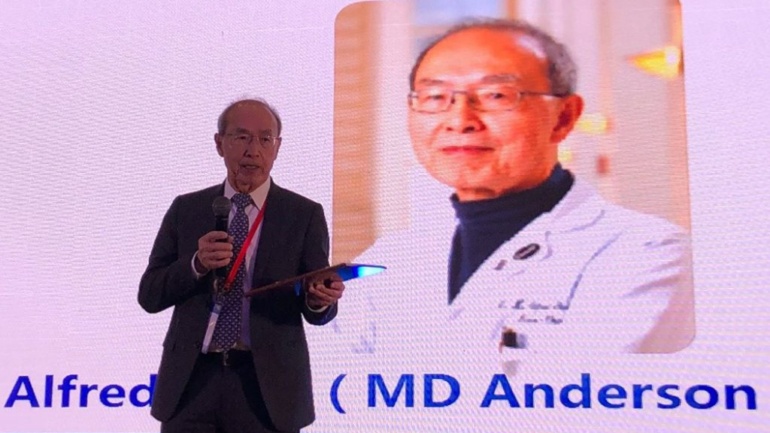THE CHALLENGE
—Tackling the Pre-Clinical Experiments to Overcome Drug Resistance
Many patients with melanoma, papillary thyroid tumors, serous ovarian tumors, and colorectal tumors, for example, have DNA mutations that hyperactivate the major cell growth and survival pathway Ras/Raf/MEK/ERK, causing abnormal growth and cancer.
Unfortunately, patients may have an intrinsic resistance to the standard Raf and MEK inhibitors before they begin treatment, resulting in reduced beneficial effects. Or an acquired resistance to the drugs may develop during treatment—usually extending patients’ lives by only 6 months.
AFCR had funded Professor JiangCheng Hu and his expert team of molecular biologists on an important cancer treatment initiative that could benefit 40% of cancers for two years.
Research from Prof. Hu and his team revealed the molecular basis underlying the resistance of the standard, first-generation RAF/MEK inhibitors. Moreover, the scientists identified several molecules from structure-based virtual ligand screening that could kill the mutated cancer cell lines. Although the compounds needed improvement in their selectivity, and higher doses were needed than doses in the therapeutic acceptable range, their research was a remarkable accomplishment.
Based on Prof. Hu’s significant discoveries that provide the framework for next-generation inhibitors without development of resistance, an expert chemist could undertake a research initiative and design and synthesize new small molecule agents with both improved potency and high selectivity.
Significantly, if these improvements can be accomplished, the next-generation of inhibitors may effectively target the aberrant signaling in these cancers—so patients can live without fear of treatment resistance.
THE ANSWER
—A Collaborative Force of Scientists with Complimentary Expertise
To further this research development, AFCR fostered a global collaboration with Prof. Hu and National Foundation for Cancer Research (NFCR)-supported scientist and renowned chemist, Dr. Amos Smith, III, Rhodes-Thompson Professor of Chemistry, University of Pennsylvania. An exemplary scientific match was made.
Prof. Smith is celebrated in the field of organic chemistry with his history in the area of complex molecule synthesis, specifically of anticancer compounds. A collaboration between the Smith and Hu labs could propel the needed research to complete the development of the next-generation of Raf/MEK inhibitors and potentially impact numerous patients with an effective treatment without the major clinical problem of drug resistance.
AFCR is now supporting Prof. Smith‘s team of chemists and they have developed an efficient process synthesis of the lead candidate made by Prof. Hu’s team. This will allow the chemists to synthesize large amounts of the compound for further biological testing. The chemists are also designing and synthesizing a library of new small molecule agents that will have various modifications of the specific molecular parts of the lead compound. These compounds will be used to probe the structure of the target proteins in the cancer cells. Prof. Hu’s lab will test the small molecules in cancer cell lines and mutated xenograft mouse models, and patient-derived xenograft models. The compound with the highest therapeutic potency with minimal adverse effects can be determined.
THE IMPACT
—Improve Treatment Outcomes for Patients and More
The Impact and Benefits of this research program are three-fold.
First, there is the real potential by Prof. Smith’s team to design, synthesize and validate a series of exciting new analogs based on the small lead molecule discovered by Prof. Hu, that will have a high potency for killing cancer cells.
Second, with the complimentary expertise of Prof. Hu and Prof. Smith, this AFCR-supported research should make it possible to bring the new drug candidates into the clinics to reach patients in a clinical trial.
Third, this research program will provide excellent interdisciplinary training for young talented synthetic organic chemist and scientists who are interested in cancer biology given this exciting collaboration.
HOW YOU CAN HELP
—You Can Bring the Hope for Effective, Non-Resistant Treatments
Your support of AFCR will enable this crucial research to develop a potential new treatment that can significantly improve treatment outcomes and affect the lives of numerous cancer patients whose tumors contain aberrations of this major signaling pathway.
Significantly, the next-generation of inhibitors may effectively target the aberrant signaling in these cancers—so patients can live without fear of treatment resistance.
Can we count on your support today? When you make a generous gift to AFCR, you give HOPE to every person in Asia and around the world who is fighting a cancer with this deadly, abnormal signaling.
In short, your support will lead directly to greatly improved approaches to treating many types of cancer and creating more survivors! Please take a moment to renew your support today. On behalf of every single man, woman, and child with cancer whose life you will touch through your support of AFCR, thank you again for all you can do.



